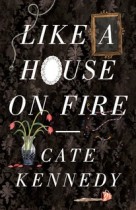Cate Kennedy says stories are living, breathing entities that refuse to be corralled by aphorisms.
There are 15 short stories in her latest book, Like a House on Fire, and all live and breathe deeply. I’d read a couple of the stories before in other contexts but was pleased to read them again and to find new insights.
“Tender” shows the mother of small children taking stock on the night before travelling to the city to have a lumpectomy. She realises that her own and her husband’s obsession with mud bricks, toxicity and solar power has buckled under the weight of everyday life; that their “grand theory of sustainability” has been modified to “more prosaic reality”.
Their house and life is teetering on the verge but the woman stays up to finish her son’s model of “a little world” due the next day, and finds herself at 5 am searching for moss to create its tiny hills.
“Five Dollar Family” works metaphors of motherhood and babyhood to fine advantage. The startle reflex and the let-down reflex contain revelations for a new mother disappointed by her partner but whose power over her is receding.
“Ashes” shows a son reticent to fit into the life narrative his parents want to write for him. Even after his father’s death, Chris finds himself kicking back at his mother’s “nauseating revisionism”.
Eventually, though, he finds himself wondering what it would have cost him to answer his father with enthusiasm, instead of shrugging “just for the mean pleasure of feeling his father turn away, defeated”.
Kennedy’s writing is deft, clever, well-paced and understated. Stand-out phrases shimmer off the page like heat haze on the horizon.
In “Ashes”, Chris finds that reminders of his father are everywhere “set like mousetraps ready to snap”. In “Flexion”, an unlikeable man is injured in a farm accident and, at home in bed after lengthy rehabilitation, his wife’s gains greater comprehension of his suffering, shocked by his frailty and ruin: “She glances over and makes out the shape of him in the moony dimness, flat on his back and still as a tree, arms at his sides like a soldier at attention, and crying soundlessly, eyes screwed shut and face contorted into a mask.”
In “Like a House on Fire” a man who has had 16 weeks of excruciating back pain from lifting heavy duty hedge-clippers over his head crawls to his usual spot on the floor “like a beaten dog”.
Kennedy says she has a penchant for the ordinary in her stories — for looking at things often taken for granted in a fresh way.
“Whirlpool” perfectly captures a long, hot Australian summer where swimming in the backyard pool and making whirlpools becomes the most natural and desirable place for a child to want to be.
“72 Derwents”, a longer story told from a child’s perspective, traverses dark and seamy territory without unbalancing the tenor and tone of the child’s eye view.
The stories in Like a House on Fire may strike some readers as simple due to Kennedy’s assured voice and uncomplicated plots. Don’t be misled. Kennedy manages to locate moments in families, couples or individual lives where the world cracks open and deeper mysteries are revealed.
Likewise, her exposure of each character’s soft underbelly can open a chink of understanding for readers about their own fragility and that of others.
There’s a priceless moment in “Like a House on Fire” when the man with the bad back climbs the stairs on Christmas eve. In Santa Claus mode he gropes painfully in the darkness towards his sons’ beds. One of his sons is awake. This son has felt the tension in his parents’ marriage caused by his father’s prolonged illness and intensified by his mother having to work on Christmas eve to pay the bills.
The boy asks “Santa” how the reindeers are.
Then, with perfect timing, he queries, “And Mrs Clause?”
It is for delicious moments like these and for plenty more that you should read Cate Kennedy. She is one of our finest short story writers and a keen observer of life in all its oddness, humour, beauty and melancholy.
She recently told fellow Australian author, Helen Garner, that she hates a story to feel forced. “I want to set my image down quietly, like a butler, and back away on tiptoe.”
And, yes, Cate Kennedy’s stories are that poised.




Thank you Marjorie, for 1) introducing me to Cate Kennedy, and 2) articulating so beautifully what struck me about this book. It’s a gem and as you said, it requires great skill to write so deceivingly ‘simple’. It’s my next BYO book club pick. Thanks again!
And congratulations on your blog, I love it.